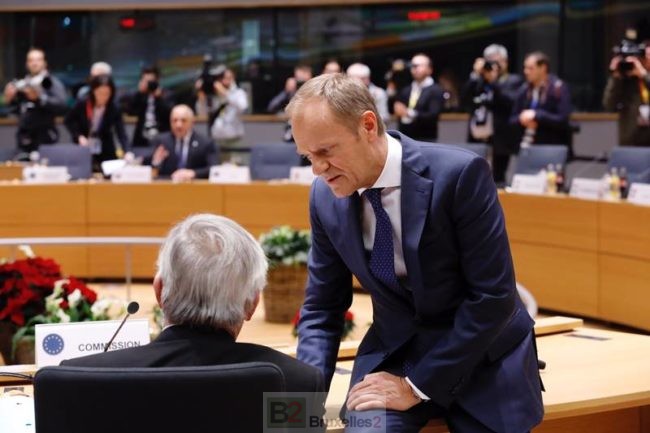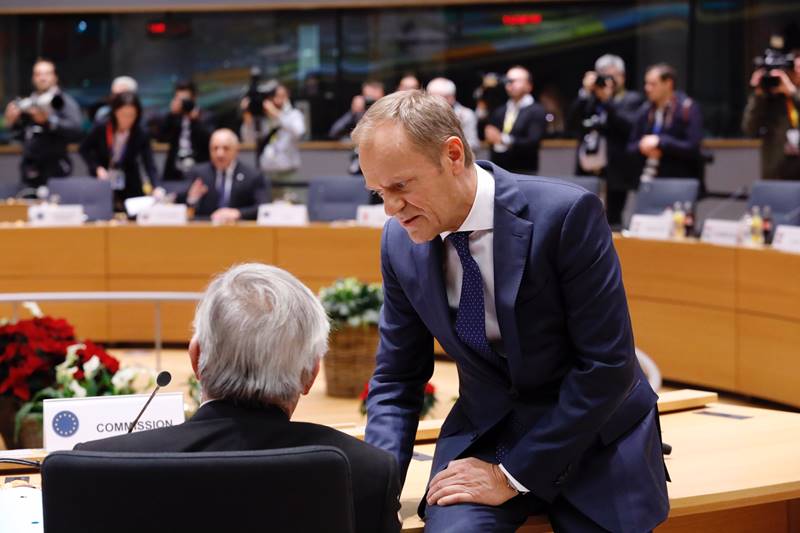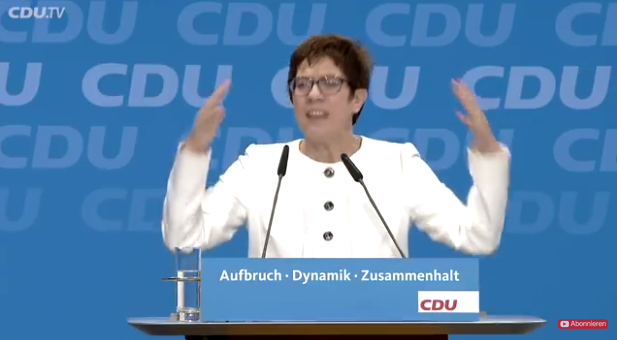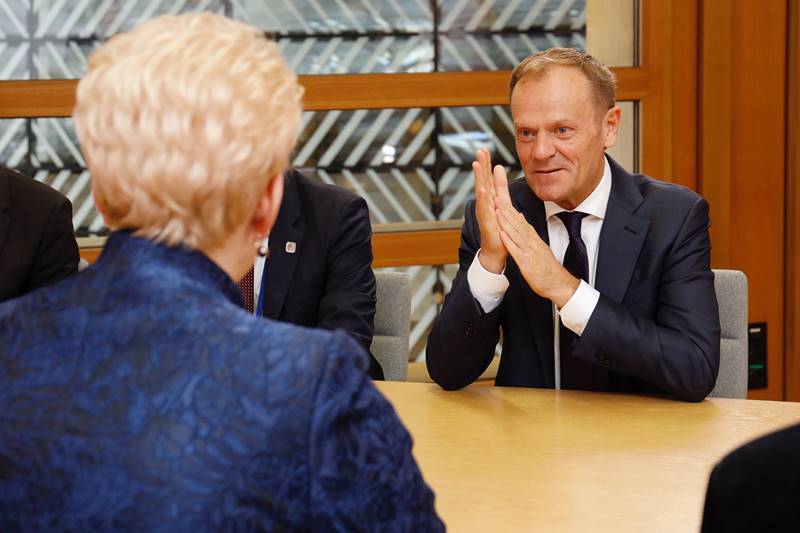European Council, Commission, High Representative… The candidates for the 'top chef' of 2019?
(B2) At a time when the Brexit puzzle is ringing in everyone's mind, taking an interest in the possible heads of tomorrow's Europe seems illusory. " It's way too early “thus confided to me several actors, diplomats and observers licensed on the European scene, whom I questioned...

And yet... everyone thinks about it! By June or July 2019, at the latest, it will indeed be necessary to have chosen a President of the European Commission. This will trigger the choice of other European heads, starting with his alter ego, the President of the European Council, the President or Presidents of the European Parliament, as well as the High Representative of the EU for Foreign Policy (1) .
To the European Commission
The official suitor is Manfred weber, candidate of the European People's Party. He claims, if his party comes first in the European elections (as it always seems to be the case in the polls), to chair the European Commission. A logical destiny that comes up against three problems: some members of the European Council do not seem determined to promote this system of SpitzenKandidat; the man who has certain qualities does not fit the unwritten criteria for that position; he is the representative of a party, which can lead to certain divisions when voting in the European Parliament (read: What hides the candidacy of Manfred Weber to the Commission?). His natural destiny would therefore rather lead him to run for the presidency of the European Parliament.
The possible challenger is the French Michel Barnier which has many advantages for him, a profile well known to Heads of State and Government, as well as to the European Parliament, friendships and networks that go beyond his political chapel, a true European profile as we like them in Brussels (read: Michel Barnier as President of the European Commission?). It is still necessary that Emmanuel Macron, the only decision-maker in his soul and conscience in terms of post at the European Commission, wants it. If France 'wants the job', " it will be difficult to refuse him indicates a keen observer consulted by B2.
The candidacy of Margrethe Vestager, a time evoked (especially by some elements of the republic in march), seems unrealistic... today. The Dane does not really have the support of her government, the first criterion for this position. She has the handicaps of her country, which does not participate in all European policies. Finally, she does not belong to the majority party (EPP) at European level, since she is a member of the Danish social-liberal party (RV). Curtain... Read: The end of the Vestager dream at the head of the 2019 Commission?
The Presidency of the European Council
In the European Council, it is the name of Mark Rutte, which comes up regularly as an antiphon. The Dutch Prime Minister (Liberal) could take over the role of intercessor and moderator of the Heads of State and Government. It is still necessary that he wants to leave his national post... and that the other heads of state and government want it. The role of bogeyman of the Netherlands, whether in the monetary crisis on the role of the 'strong' Euro or vis-à-vis the countries of Eastern Europe, in delicacy with certain chapters of the Rule of law, and its positioning for the least follower of the slightest European commitment, could expose it to a few 'clear' or discreet vetoes, preventing it from applying. Odds: 1 in 4.
A possible challenger is the Lithuanian Dalia Grybauskaite (-). A follower of outspokenness, a good connoisseur of certain European issues – she managed the Agriculture portfolio – she has a few advantages: being a woman, representing Eastern Europe, and not being included in a political party. . Even if it is not very far from the Christian Democrats, it has often had to govern in cohabitation with a government made up of Social Democrats, peasants and Greens. What could be more eclectic. In addition, she is available, as her mandate as President (non-renewable) ends in May. In a way, she would embody a certain continuity with Donald Tusk. A follower of outspokenness, she always has the right word when she arrives at European Council meetings. What assures him of a certain celebrity in the press. She still has to want it. At the latest news, the person concerned denied being a candidate. But that kind of denial gives way quickly. Score: 2 out of 4.
Another possible candidate, the Finn Juha Sipila of the center party (Kesk / ALDE) could quickly find themselves available if his party suffers a defeat in the legislative elections. He has the advantage of coming from a 'modest' country, located on the borders of Russia, therefore well aware of the risks and threats of the new configuration in Moscow, of being a member of the Euro and of having played a significant and positive role in the migration crisis. He is well regarded in Paris as in Berlin, which is not a disadvantage. He is discreet, but very present in European games. Score: 2 out of 4.
Finally, the Belgian Charles Michel (Libéral / ALDE) is pointing the tip of its nose in the European sphere, as a 'spare wheel' of a possible non-renewal at the head of the Belgian government after the general elections next May. The daily article Le Soir expressly mentions it. Even if the Belgian Prime Minister has so far shown no specific appetite for European issues, he is more interested in them than his predecessor Elio di Rupo. If it can be hard to believe, you should always be wary of Belgians when their eyes twitch. They have no equal to achieve their ends (cf. the precedent of Herman Van Rompuy). Score: 1 out of 4.
The post of head of European diplomacy
As High Representative of the EU, it is the total unknown. The potential candidates to succeed Federica Mogherini as High Representative on 1 November next are no longer really jostling at the 'gate'. For several 'big' countries (France, Italy, the Netherlands...), the position is not really of interest, because the High Representative is too busy with foreign affairs, and not very available on 'economic' subjects. ' or internal policy, primary competences of the European Commission. B2 went around the potential or possible candidates, in a paper weighing the advantages and handicaps of each (read: Commission 2019. The candidates for the post of High Representative are not rushing. Six possible and eventual names?).
The current German Minister Ursula von der Leyen (CDU / EPP) has had its day at the head of the German Defense. And the one who was, for a time, perceived as a possible rival of Angela Merkel no longer has any hope on that side. A new European future would allow her to bounce back in a field, European affairs, where she is comfortable and has obtained certain results. The Slovak Miroslav Lajčak (S&D) would also not shy away from returning to the European sphere after its tenure as Chairman of the OSCE. But the more limited scope of Slovak diplomacy would make it more open to the post of deputy commissioner/high representative, in charge of enlargement and the neighbourhood. A Spanish candidate could also burst in, Josep Borrell (S&D) if applicable. But his age could be a serious handicap. And another / or another Spanish could be chosen. Which corresponds to Madrid's desire to impose itself on the diplomatic scene.
A few challengers were mentioned. But they don't really meet all the criteria. This is the case of the social-democratic SpitzenKandidat, Frans Timmermans who has the same handicap as Mr. Vestager: he is not supported by his government. The Belgian Didier Reynders (Liberal) could have been an excellent High Representative. But he announced this candidacy for the post of Secretary General at the Council of Europe. The Swedish Margot Wallström (S&D) could also have emerged. She meets a good part of the criteria (experienced, social democrat and woman). But, as with Josep Borrell, his age could be a handicap. Except to reprofile the post of High Representative in a more political dimension and less of a globetrotter. Topic to follow...
(Nicolas Gros-Verheyde)
Read our file No. 67. European elections 2019



ping: Elections 2019: the EPP-S&D axis loses its absolute majority - B2 Bruxelles2
ping: Bilateral talks that are not just about seeing each other - B2 Brussels2